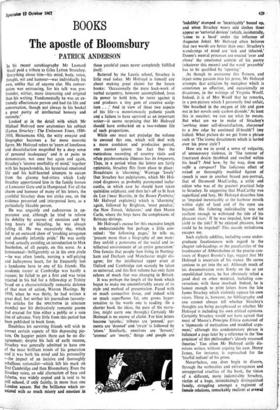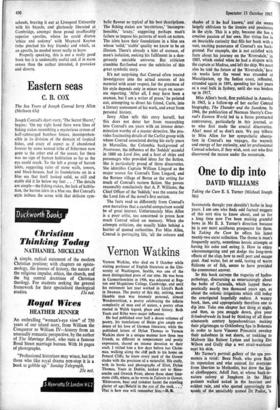The apostle of Bloomsbury BOOKS
PATRICK ANDERSON
In his recent autobiography Mr Leonard Woolf paid a tribute to Giles Lytton Stratchey. 'Everything about him—his mind, body, voice, thought, wit and humour—was individually his own, unlike that of anyone else. His conver- sation was entrancing, for his talk was pro- founder, wittier, more interesting and original than his writing. Fundamentally he was an ex- tremely affectionate person and had (in life and conversation, though not always in his books) a great purity of intellectual honesty and curiosity.'
Looked at in the detail with which Mr Michael Holroyd now anatomises his subject (Lytton Strachey: The Unknown Years, 1880- 1910, Heinemann 63s), the witty essayist and biographer becomes a far more neurotic figure. Mr Holroyd refers to 'years of loneliness and dissatisfaction magnified by a deep sense of personal inadequacy' and is at pains to demonstrate, not once but again and again, Strachey's 'intense morbidity of mind,' together with his hypochondria, his hysterical emotional life and his half-hearted attempts to escape from the gloomy bed-sitters which Lady Strachey apportioned him in the family houses at Lancaster Gate and in Hampstead. For all the charm and humour of many of his letters, the youthful Strachey does not strike one, on the evidence presented and interpreted here, as a particularly likeable person.
He was ungainly and cadaverous in ap- pearance and, although he tried to relieve his debility by courses of exercises and by long hours of bicycling, he was always falling ill. He was excessively shy, which led to an outward show of 'crushing arrogance and absurdly infantile pride.' He was easily bored, actually avoiding an introduction to Max Beerbohm, of all people, on this score. As a homosexual—belligerently so in his own circle he was often lonely, nursing a self-pitying and lachrymose heart, for he frequently lost a handsome hero to one of his friends. His academic career at Cambridge was hardly a success; he failed to get a first and was twice rejected in his bid for a fellowship at Trinity based on a characteristically romantic defence of that man of action, Warren Hastings. By 1910, when he was thirty, he had written a great deal, but neither his journalism (seventy- five articles for the SPECTATOR in nineteen months) nor his derivatively romantic poems had created for him either a public or a sure line of advance. Very little from this period has been published in book form.
Doubtless his surviving friends will wish to correct certain aspects of this depressing pic- ture. On happier points there can be no dis- agreement; despite his lack of early success, Strachey was generally admitted to have one of the most brilliant minds of his generation and it was both his mind and his personality —the impact of an incisive and thoroughly rebellious rationalist—which left his mark on first Cambridge and then Bloomsbury. Even the Strachey voice, an odd alternation of bass and falsetto, was widely copied and is said to be still echoed, if only faintly, in more than one London square. But the brilliance which co- existed with so much misery and emotion'in
these youthful years never completely fulfilled itself.
Battered by the Leavis school, Strachey is little read today. Mr Holroyd is himself coy about making great claims for the future books: 'Occasionally the mere hack-work of verbal carpentry, however accomplished, loses its power to hold him, he turns against it and produces a tiny gem of creative sculp- ture . .' And in view of these two aspects of his life—a monotonously pathetic youth and a failure to have survived as an important writer—it seems surprising that Mr Holroyd should have embarked on a two-volume life of such proportions.
While one must not prejudge the volume to succeed this one, which will deal with a more Confident and productive period, one cannot ignore the fact that the meticulous recording of country visits and often psychosomatic illnesses has its longueurs, Thus, in a period when the letters are fairly optimistic, Strachey flits from place to place: Broadstairs is 'charming,' Wantage 'lovely' (but Strachey has palpitations, which Mr Hol- royd diagnoses as probably paroxysmal tachy- cardia, in which case he should have taken quinidine sulphate), and then he's off to St Jean de Luz ('near Biarritz, in the Basses Pyrenees,' Mr Holroyd explains),) which is 'charming' again, followed by Brighton, 'most peculiar,' the New Forest, 'delicious,' and then Monte Carlo, where the boys have the complexions of Brittany shrimps.
Mr Holroyd's excuse for this excessive length is understandable but perhaps a little con- ceited: 'the following pages,' he tells us, 'present more than a biography of one man: they unfold a panorama of the social and in- tellectual environment of an entire generation.' One fancies that people then living in Notting- ham and Durham and Manchester might dis- agree; for the intellectual upper crust at Oxford and Cambridge can scarcely be taken as universal, and this first volume has only faint echoes of much that was changing in Britain.
It was perhaps the length of the book which began to make me uncomfortably aware of its style and method of presentation. Faced with so much connective tissue, and indeed with so much superfluous fat, one grows hyper- sensitive to the words one is reading. (In a shorter book the ideas, the pace of the narra- tive, might carry one through.) Certainly Mr Holroyd is no enemy of cliché. For him letters become 'epistles,' tributes are 'penned,' gar- ments are 'donned' and.'strain' is followed by 'stress.' Similiarly, emotions are 'fervent,' 'aromas' are 'musty,' things and people are indelibly' stamped or 'inextricably' bound up, and when Strachey wears odd clothes these appear as 'sartorial devices' (which, incidentally, 'come to a head' under the influence of Augustus John). Mr Holroyd often believes that two words are better than one: Strachey's wanderings of mind are 'sick and infected,' Donne's mental processes are erected 'over and above' the emotional context of his poetry (whatever this means) and the word 'preamble' has to be qualified by 'opening.'
As though to overcome this flatness, and inject some passion into his prose, Mr Holroyd attempts that criticism by metaphor which is sometimes so effective, and occasionally so disastrous, in the writings of Virginia Woolf. Indeed, it is of Mrs Woolf that he remarks, in a pen-picture which I personally find unfair, 'She breathed in the oxygen of life and gave out, in her novels only carbon dioxide.' At least this is succinct; we can see what he means. But what are we to make of Strachey's 'seething inner self-dissatisfaction, sharpened to a fine edge by continual ill-health'? (my italics). What picture do we get from a phrase such as 'The-ironic detachment which is larded over his prose style'?
How are we to avoid a sense of vulgarity, of unnecessary violence, in 'The tumour of frustrated desire throbbed and swelled within his head'? And how, by the way, does one ruffle a carapace? The ludicrous effect of mixed or thoroughly muddled figures of speech is seen in another biased pen-portrait, that of Desmond MacCarthy, a critic and editor who was of the greatest practical help to Strachey. In suggesting that MacCarthy was superficial and lazy, Mr Holroyd describes him as 'impaled inextricably at the harbour mouth within sight of land and of the open sea beyond. His faltering individuality was not resilient enough to withstand the tide of his pleasant vices.' If he was impaled, how did he yield to the tide? If he enjoyed pleasure, how could he be impaled? This seaside melodrama escapes me.
Such stylistic oddities, including some under- graduate facetiousness with regard to the chapter sub-headings or the peculiarities of the headmaster of Abbotsholme or the precise con- tours of Rupert Brooke's legs, suggest that Mr Holroyd is uncertain of his stance. He seems anxious to get into the act. Although much of his documentation rests firmly on the as yet unpublished letters, he has obviously relied a good deal on other material, including con- versations with those involved. Indeed, he is honest enough to print letters from the late James Strachey which violently oppose his own views. There is, however, no bibliography and one cannot always tell whether Strachey's thoughts are being paraphrased or whether Mr Holroyd is including his own critical opinions. Certainly Strachey would not have agreed that most of Moore's Principia Ethica consisted of a 'rigmarole of meticulous and muddled argu- ment,' although this condemnatory phrase is balanced a page later by a reference to the 'fine precision' of this philosopher's 'closely reasoned theories.' Too often Mr Holroyd airily dis- misses writers without arguing his case. Henry James, for instance, is reproached for the 'fearful tedium' of his prose.
Nevertheless, one does begin to discern, through the verbosities and extravagances and unsupported cruelties of the book, the vision of a different, more indomitable Strachey, victim of a huge, intimidatingly distinguished family, struggling amongst a regiment of female relations, remarkably resilient at several schools, braving it out at Liverpool University with his bicycle, and gloriously liberated at Cambridge, amongst those proud insufferably superior apostles, where he could discuss 'ethics and sodomy' with Maynard Keynes (who pinched his boy friends) and which, as an apostle, he needed never really to leave. Properly speaking, this is not a really good book but it is undeniably useful and, if in more senses than the author intended, it provokes and diverts.



































 Previous page
Previous page